|
|
|
Sort Order |
|
|
|
Items / Page
|
|
|
|
|
|
|
| Srl | Item |
| 1 |
ID:
082054
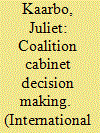

|
|
|
|
|
| Publication |
2008.
|
| Summary/Abstract |
This essay reviews the intersection between institutional and psychological conditions that occurs in multiparty coalition cabinets and the effects on foreign policy and decision making. Parallel research in social psychology and foreign policy can provide clues to the underlying mechanisms linking institutional context to policymaking and policy choices. The psychological processes involved in group polarization, persuasion, and other influence strategies as well as psychological factors affecting the quality of decision making are important in coalition cabinets and are reinforced by the particular institutional dynamics of multiparty governance. Indeed, this essay proposes that future research focus on contingency factors in the policymaking process, given the competing views on the effects of multiple advocacy on the quality of decision making and on the types of foreign policies associated with multiparty cabinets. More broadly, this essay supports the view that a highly structural understanding of the effects of institutions on politics and policies is incomplete and that research on the interplay among structures and human agents is critical.
|
|
|
|
|
|
|
|
|
|
|
|
|
|
|
|
| 2 |
ID:
111633
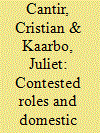

|
|
|
|
|
| Publication |
2012.
|
| Summary/Abstract |
Many of the strengths of research in Foreign Policy Analysis have been overlooked by role theorists. Role theorists often assume that roles are shared across elites and masses, that elites can manipulate masses, or that public opinion on roles constrains elites. Role theorists also tend to assume that there is a consensus among elites over national roles. Research in Foreign Policy Analysis, on the other hand, demonstrates that foreign policy may be contested both vertically (between elites and masses) and horizontally (among elites) and that these conflicts affect foreign policy decision making and foreign policy behavior. We propose that (i) contested roles mean that roles and foreign policy are not as stable as is often implied; (ii) research on contested roles offers Foreign Policy Analysis a less preference-oriented way of conceptualizing policy disagreements and decision making; and (iii) structures reveal themselves as important when agents use them in domestic discourse over contested roles, but the impact of international norm and role structures is not automatic, as it is shaped by the agents (and domestic structures) in the domestic political process. We suggest that research on the strategic use of roles could bring together these benefits of examining contested roles.
|
|
|
|
|
|
|
|
|
|
|
|
|
|
|
|
| 3 |
ID:
136608


|
|
|
|
|
| Summary/Abstract |
Why do multiparty cabinets in parliamentary democracies produce more extreme foreign policies than single-party cabinets? Our paper argues that particular institutional and psychological dynamics explain this difference. We test this argument using a global events data set incorporating foreign policy behaviors of numerous multiparty and single-party governments. We find that more parties and weak parliaments promote extremity in coalitions, but parliamentary strength has the opposite effect for single-party governments. This study challenges existing expectations about the impact of democratic institutions on foreign policy.
|
|
|
|
|
|
|
|
|
|
|
|
|
|
|
|
| 4 |
ID:
145705


|
|
|
|
|
| Summary/Abstract |
Over the last 25 years, there has been a noteworthy turn across major International Relations (IR) theories to include domestic politics and decision-making factors. Neoclassical realism and variants of liberalism and constructivism, for example, have incorporated state motives, perceptions, domestic political institutions, public opinion, and political culture. These theoretical developments, however, have largely ignored decades of research in foreign policy analysis (FPA) examining how domestic political and decision-making factors affect actors’ choices and policies. This continues the historical disconnect between FPA and “mainstream” IR, resulting in contemporary IR theories that are considerably underdeveloped. This article revisits the reasons for this separation and demonstrates the gaps between IR theory and FPA research. I argue that a distinct FPA perspective, one that is psychologically-oriented and agent-based, can serve as a complement, a competitor, and an integrating crucible for the cross-theoretical turn toward domestic politics and decision making in IR theory.
|
|
|
|
|
|
|
|
|
|
|
|
|
|
|
|
| 5 |
ID:
081163
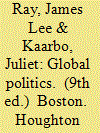

|
|
|
|
|
| Edition |
9th ed.
|
| Publication |
Boston, Houghton Mifflin Company, 2008.
|
| Description |
xix, 578p.Pbk
|
| Standard Number |
9780618783434
|
|
|
|
|
|
|
|
|
|
|
|
Copies: C:1/I:0,R:0,Q:0
Circulation
| Accession# | Call# | Current Location | Status | Policy | Location |
| 053275 | 909.82/RAY 053275 | Main | On Shelf | General | |
|
|
|
|
| 6 |
ID:
180833


|
|
|
|
|
| Summary/Abstract |
This article considers how leaders' personality traits change over time. I focus on how leaders become more authoritarian, overconfident and more mistake-prone; how, when and why do leaders ‘break bad’? Temporal evolution of leaders is an important topic given the long tenure of many political leaders and the influence these leaders have over policies, including foreign policies. There is very little work on how leaders' personalities develop and how they interact with changing constraints and opportunities. This article is an agenda-setting review, designed to push foreign policy analysis in new directions. This is especially important given the resurgence in research on personalities and the renewed interest in leaders. Drawing on diverse and multi-disciplinary scholarship on the psychological effects of aging, experience, learning and power-holding, this article develops expectations about leader personality change. I discuss challenges for research in this area, focusing on how ‘bad’ can be conceptualized, and offer specific avenues for future investigations.
|
|
|
|
|
|
|
|
|
|
|
|
|
|
|
|
| 7 |
ID:
143592
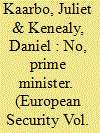

|
|
|
|
|
| Summary/Abstract |
On 29 August 2013, the UK House of Commons inflicted the first defeat on a Prime Minister over a matter of war and peace since 1782. Recalled to debate and vote on UK intervention in Syria, the Commons humbled the government and crucially impacted the development of UK foreign policy. This article places that vote, and the developments leading to it, in the context of the role of parliaments in security policy and explores the relationships between parliamentary influence, leadership, intra-party and intra-coalition politics, and public opinion. From an in-depth analysis of leaders’ statements and parliamentary debate, we find a combination of intra-party politics and party leadership were most significant. An additional factor – the role of historical precedent – was also important. Our analysis explores the fluidity and interconnectedness of the various factors for parliamentary influence in foreign policy and offers directions for future theoretical development and empirical research.
|
|
|
|
|
|
|
|
|
|
|
|
|
|
|
|
| 8 |
ID:
179803


|
|
|
|
|
| Summary/Abstract |
It is often noted that former US President Donald Trump brought unpredictability to Washington’s relationship with China. This may appear intuitively true, but in what ways was Trump actually ‘unpredictable’ towards China? We show that the most unpredictable feature of Trump’s approach was his rhetoric, strongly defined by impulsivity, emotion and provocation. This generated rhetorical unpredictability which was regularly seen in inconsistent and contradictory statements. Using political psychology and leadership personality approaches, we further demonstrate that this unpredictable rhetoric can be traced to Trump’s psychological profile. We argue that while the composition of Trump’s China rhetoric was often difficult to anticipate, as a component of his US China policy it was predictable to the extent that it was grounded in his personality. Trumpian China policy broadly followed longer-term trends, but the president’s erratic rhetoric had domestic and international consequences for the relationship. The article further contributes to work on unpredictability in international relations (IR), and on leadership personalities and foreign policy.
|
|
|
|
|
|
|
|
|
|
|
|
|
|
|
|
| 9 |
ID:
126794


|
|
|
|
|
| Publication |
2013.
|
| Summary/Abstract |
Despite renewed interest in role theory and its promise to relate to agent-structure relationships, research in this area has underdeveloped notions of 'agency' and an incomplete understanding of the interaction between 'agency' and 'structure'. This problem can be attributed, in part, to the fact that the theory frequently overlooks the centrality of domestic political agents in the process of role conflict. An analysis of Danish decision-making over the country's involvement in Iraq and of Dutch decision-making over its involvement in Afghanistan illustrates the theoretical and empirical advantages of examining role conflicts with a focus on domestic politics. We conclude that studying role conflict as embedded in domestic political processes is important in the development of role theory in international relations research.
|
|
|
|
|
|
|
|
|
|
|
|
|
|
|
|
| 10 |
ID:
081311


|
|
|
|
|
| Publication |
2008.
|
| Summary/Abstract |
Institutional constraints have been offered by some scholars as an explanation for why multiparty coalitions should be more peaceful than single-party cabinets. Yet others see the same institutional setting as a prescription for more aggressive behavior. Recent research has investigated these conflicting expectations, but with mixed results. We examine the theoretical bases for these alternative expectations about the effects of coalition politics on foreign policy. We find that previous research is limited theoretically by confounding institutional effects with policy positions, and empirically by analyzing only international conflict data. We address these limitations by examining cases of foreign policy behavior using the World Event/Interaction Survey (WEIS) dataset. Consistent with our observation that institutional constraints have been confounded with policy positions, we find that coalitions are neither more aggressive nor more peaceful, but do engage in more extreme foreign policy behaviors. These findings are discussed with regard to various perspectives on the role of institutions in shaping foreign policy behavior
|
|
|
|
|
|
|
|
|
|
|
|
|
|
|
|
| 11 |
ID:
178597
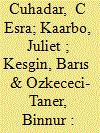

|
|
|
|
|
| Summary/Abstract |
Using both quantitative and qualitative research techniques, we investigate the effect of leaders’ style and personality on foreign policy. The study examines six Turkish leaders, Süleyman Demirel, Bülent Ecevit, Necmettin Erbakan, Recep Tayyip Erdoğan, Abdullah Gül, and Turgut Özal, and 18 foreign policy cases to answer the following questions: do Turkish leaders differ from each other in terms of their personality traits and styles?; how did their styles affect their foreign policy choices?; and how did they react to various domestic and international constraints they encountered in cases of foreign policy? Our findings suggest that: (a) in terms of their personality traits, Turkish leaders do not collectively fit in one category; (b) there are some stark differences among our six leaders, although some leaders are more similar to each other than others in terms of their personality traits and styles; (c) these differences were observable in the foreign policy decisions they made.
|
|
|
|
|
|
|
|
|
|
|
|
|
|
|
|
| 12 |
ID:
191723


|
|
|
|
|
| Summary/Abstract |
Because of his personality, had Donald Trump won the 2020 election the remarkable and unexpected united response by NATO allies to the February 2022 Russian invasion of Ukraine would not have happened. Relying on leader personality research in foreign policy, we demonstrate this by using the counterfactual method of analysis. Specifying key differences between Biden's and Trump's personalities in terms of their experiences, traits and beliefs, we explicitly show that president Trump would have been very unlikely to share US intelligence, rally NATO allies in support of Ukraine or challenge Vladimir Putin. In contrast, these responses fit very well with Joe Biden's personality. We first present counterfactual analysis as a method before comparing Biden and Trump along personality characteristics known to significantly influence foreign-policy decisions. Through our case-study, we demonstrate the value of using systematic and theoretically grounded counterfactual methods for assessing the importance of individual differences between leaders and emphasizing their impact on international affairs.
|
|
|
|
|
|
|
|
|
|
|
|
|
|
|
|
| 13 |
ID:
095639
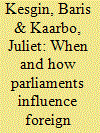

|
|
|
|
|
| Publication |
2010.
|
| Summary/Abstract |
Turkey's decision on its role in the Iraq war in 2003 illustrates the power-and limits-of parliaments as actors in foreign policy. Traditionally, assemblies are not seen as important players in the foreign policies of parliamentary democracies. Instead, cabinets are generally considered the chief policymaking authorities. If the government enjoys a parliamentary majority, legislatures typically support the cabinet, if they are brought into the process at all. The March 1, 2003 vote by the Turkish parliament to not allow the United States to use Turkey as a base for the Iraq invasion challenges this conventional wisdom on parliamentary influence (in addition to many interest-based explanations of foreign policy). This paper examines this decision in the context of the role of parliaments in foreign policies and explores the relationships between parliamentary influence, leadership, intraparty politics, and public opinion
|
|
|
|
|
|
|
|
|
|
|
|
|
|
|
|
|
|
|
|
|